
Nature Reviews Chemistry
Scope & Guideline
Your Gateway to Cutting-Edge Chemical Discoveries
Introduction
Aims and Scopes
- Interdisciplinary Chemistry:
The journal covers a wide range of topics across various branches of chemistry, emphasizing the integration of principles from organic, inorganic, physical, analytical, and materials science. - Emerging Technologies and Methodologies:
Nature Reviews Chemistry showcases advancements in chemical methodologies, including synthetic techniques, catalysis, and materials development, with a focus on their practical applications and implications. - Environmental and Sustainability Chemistry:
The journal emphasizes research that addresses environmental challenges, sustainable practices, and the development of green chemistry solutions to promote a more sustainable future. - Biochemical and Medicinal Chemistry:
There is a strong focus on the chemistry of biological systems, including drug discovery, biomolecular interactions, and the development of therapeutics, highlighting the intersection of chemistry and biology. - Educational Initiatives in Chemistry:
The journal promotes educational advancements in chemistry, discussing methods to enhance teaching and learning in the chemical sciences, as well as fostering diversity and inclusion in the field.
Trending and Emerging
- Sustainable Chemistry and Green Technologies:
There is a marked increase in research focusing on sustainable practices, including renewable energy, carbon capture, and eco-friendly materials, reflecting a global push toward addressing climate change. - Machine Learning and Computational Chemistry:
The integration of artificial intelligence and machine learning into chemical research is trending, with increasing emphasis on computational methods for predicting chemical behaviors and optimizing reactions. - Nanotechnology and Materials Science:
Research on nanomaterials and their applications in various fields such as electronics, medicine, and environmental science is on the rise, showcasing innovations in material design and functionality. - Biomolecular Chemistry and Synthetic Biology:
Emerging studies focus on the chemistry of biological systems, particularly in synthetic biology, where researchers aim to engineer biological processes for applications in health and industry. - Chemical Education and Inclusivity:
There is a growing emphasis on improving educational practices in chemistry, with initiatives aimed at fostering diversity, equity, and inclusion within the scientific community.
Declining or Waning
- Traditional Organic Synthesis:
There seems to be a waning interest in conventional organic synthesis methods as the field shifts towards more innovative and efficient synthetic strategies, such as automation and machine learning approaches. - Inorganic Chemistry without Interdisciplinary Context:
Purely traditional inorganic chemistry topics are becoming less frequent, with a noticeable decline in research that does not integrate with other fields such as materials science or biochemistry. - Basic Physical Chemistry Studies:
Basic studies in physical chemistry, particularly those that do not relate to current technological or environmental challenges, are receiving less attention compared to applied research and technological advancements.
Similar Journals
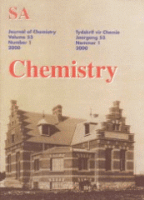
SOUTH AFRICAN JOURNAL OF CHEMISTRY-SUID-AFRIKAANSE TYDSKRIF VIR CHEMIE
Fostering Collaboration in South African ChemistrySouth African Journal of Chemistry (Suid-Afrikaanse Tydskrif vir Chemie), published by Bureau Scientific Publications, is a pivotal open-access journal that has been disseminating groundbreaking research in the field of chemistry since its inception in 1996. With an ISSN of 0379-4350 and an E-ISSN of 1996-840X, this journal serves as a vital platform for researchers and professionals seeking to share their work and engage with the global chemistry community. Recognized for its significant contributions, the journal holds a Q3 quartile ranking in the miscellaneous chemistry category as of 2023 and ranks #216 out of 408 in General Chemistry according to Scopus. The South African Journal of Chemistry is dedicated to advancing knowledge in the discipline by publishing a wide array of articles, reviews, and studies that address pertinent chemical research and applications. With open access options available since 2000, it fosters a collaborative environment, ensuring that research is accessible to all, thereby enhancing the visibility and impact of chemists' work across South Africa and beyond.
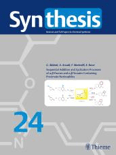
SYNTHESIS-STUTTGART
Exploring the Depths of Organic Chemistry Excellence.SYNTHESIS-STUTTGART
Published by the esteemed Georg Thieme Verlag KG, SYNTHESIS-STUTTGART stands as a vital resource in the field of Chemistry, specifically focusing on Organic Chemistry and Catalysis. With an impressive publication history dating back to 1970 and continuing through 2024, it serves as a platform for innovative research and developments in synthetic methodologies and their applications. The journal holds a significant impact factor, reflecting its influence within the academic community, and is recognized in the Scopus rankings as a reputable source in its categories, with a rank of #99/211 in Organic Chemistry and #43/68 in Catalysis. Researchers, professionals, and students alike can benefit greatly from its content, which upholds rigorous peer-review standards and contributes to the global discourse in these critical scientific domains.

ACS Organic & Inorganic Au
Empowering Global Knowledge Exchange in ChemistryACS Organic & Inorganic Au, published by the American Chemical Society, stands as a premier open-access journal dedicated to advancing the fields of organic and inorganic chemistry. Since its inception in 2021, this journal has swiftly risen to prominence, achieving a commendable Q1 classification in Inorganic Chemistry, Organic Chemistry, and Physical and Theoretical Chemistry as of 2023. With an ISSN of 2694-247X, it provides a vital platform for researchers, professionals, and students to disseminate their findings and engage with cutting-edge work across converged disciplines. Operating from its headquarters in Washington, DC, ACS Organic & Inorganic Au is committed to fostering a collaborative research environment, encouraging rigorous peer review, and ensuring the wide accessibility of high-quality scholarly articles. With its open-access model, readers worldwide can freely access and utilize research findings, promoting a global exchange of knowledge crucial for driving innovation in chemistry.
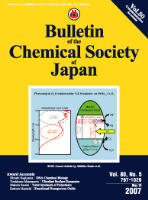
BULLETIN OF THE CHEMICAL SOCIETY OF JAPAN
Empowering Discoveries: Your Gateway to Chemical InsightsBULLETIN OF THE CHEMICAL SOCIETY OF JAPAN, published by the esteemed Chemical Society of Japan, serves as a pivotal platform for the dissemination of cutting-edge research in the multifaceted field of chemistry. With an ISSN of 0009-2673 and an E-ISSN of 1348-0634, this journal has been integral in fostering the growth of chemical sciences globally since its inception in 1965. The journal holds an impressive Q2 ranking in the Chemistry (miscellaneous) category, indicating its relevance and influence within the academic community, as reflected by its Scopus rank of #104/408, placing it in the 74th percentile. Although it is not an open-access journal, its rich content, which spans a wide range of topics in general chemistry, remains highly valued by researchers, professionals, and students alike, affirming its crucial role in advancing both theoretical knowledge and practical applications in chemistry. As it converges towards 2024, the bulletin continues to uphold its commitment to excellence in scientific communication and research dissemination in Japan and beyond.

JACS Au
Elevating chemistry research with open access insights.JACS Au, published by the American Chemical Society, is a premier open access journal dedicated to advancing research in the rapidly evolving fields of analytical chemistry, organic chemistry, and theoretical chemistry. Since its inception in 2021, JACS Au has quickly established itself as a leading platform for high-quality research, reflected in its Q1 rankings across multiple categories for 2023, including Organic Chemistry and Analytical Chemistry. The journal focuses on innovative methodologies and applications that drive the discipline forward, making it an essential resource for researchers, professionals, and students alike. With an impressive Scopus ranking, consistently placing in the top tiers of its categories, and offering a broad range of access options for its readership, JACS Au aims to foster collaboration and disseminate transformative ideas that impact the global scientific community. Exploring diverse topics within chemistry, this journal provides a vital conduit for sharing groundbreaking research and enhancing scientific dialogue.

EUROPEAN JOURNAL OF ORGANIC CHEMISTRY
Unveiling New Horizons in Organic ChemistryThe EUROPEAN JOURNAL OF ORGANIC CHEMISTRY (ISSN: 1434-193X; E-ISSN: 1099-0690), published by WILEY-V C H VERLAG GMBH in Germany, stands as a crucial platform for disseminating innovative research in the fields of organic, physical, and theoretical chemistry. With its inception dating back to 1998 and converging expertise until 2024, this esteemed journal has achieved a notable reputation, earning a Q2 rank in both Organic Chemistry and Physical and Theoretical Chemistry categories as of 2023, indicating its vital contribution to the academic community. Researchers and professionals will benefit from its rigorous peer-reviewed articles, which foster advancement in chemical sciences, while students can leverage its wealth of knowledge to enhance their learning. Although currently not an open-access journal, the content produced is invaluable for those looking to stay at the forefront of chemical research.
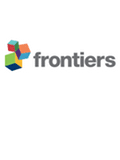
Frontiers in Chemistry
Innovating Chemistry Through Open Access Research.Frontiers in Chemistry is an esteemed and innovative Open Access journal published by FRONTIERS MEDIA SA, based in Lausanne, Switzerland. Since its inception in 2013, the journal has established itself as a leading platform for the dissemination of high-quality research across a broad spectrum of chemistry disciplines, achieving a notable Q1 classification in the miscellaneous chemistry category as of 2023. With an impressive Scopus rank, placing it at 72nd out of 408 in General Chemistry and falling within the 82nd percentile, Frontiers in Chemistry is committed to publishing significant findings that contribute to the advancement of the field. The journal's Open Access model ensures that research is freely accessible to all, fostering a greater exchange of knowledge and collaboration among researchers, professionals, and students globally. It covers a range of topics, from organic and inorganic chemistry to materials science and biochemistry, making it an essential resource for anyone seeking to stay at the forefront of chemical research.

REVUE ROUMAINE DE CHIMIE
Catalyzing Innovation in the Realm of ChemistryREVUE ROUMAINE DE CHIMIE is a distinguished academic journal in the field of chemistry, published by EDITURA ACAD ROMANE in Romania. With an ISSN of 0035-3930, this journal has been a valuable platform for disseminating original research and insights in the diverse realm of chemistry since its inception. The journal currently operates under a competitive tier, categorized in Q4 for miscellaneous chemistry fields, as reflected in its Scopus ranking of #348 out of 408, placing it within the 14th percentile. Aiming to foster scientific discourse and innovation, the REVUE ROUMAINE DE CHIMIE provides a repository of knowledge that is crucial for researchers, professionals, and students eager to advance their understanding and contribute to the global chemistry community. By bridging local and international research initiatives, this journal plays an essential role in enhancing the visibility of Romanian scientific contributions on the world stage.
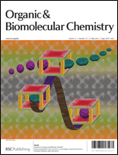
ORGANIC & BIOMOLECULAR CHEMISTRY
Exploring innovative pathways in chemistry research.ORGANIC & BIOMOLECULAR CHEMISTRY is a prestigious academic journal published by the Royal Society of Chemistry, dedicated to advancing the fields of organic and biomolecular chemistry. With its ISSN of 1477-0520 and E-ISSN of 1477-0539, this journal plays a pivotal role in disseminating high-quality research and contributing to the scientific community, particularly in biochemistry, organic chemistry, and physical and theoretical chemistry. Currently ranked in the third quartile for Biochemistry and the second quartile for Organic Chemistry and Physical and Theoretical Chemistry, it caters to a diverse audience of researchers, professionals, and students who seek insightful studies and reviews. With a publication history spanning since 2003 and ongoing till 2024, the journal fosters open access to its articles, encouraging the free exchange of knowledge. Situated in the vibrant academic environment of Cambridge, UK, ORGANIC & BIOMOLECULAR CHEMISTRY serves as a vital resource for innovative research at the intersection of chemical sciences.

Moscow University Chemistry Bulletin
Pioneering Insights in the World of ChemistryMoscow University Chemistry Bulletin is a distinguished academic journal dedicated to advancing the field of chemistry, published by PLEIADES PUBLISHING INC. With an ISSN of 0027-1314 and an E-ISSN of 1935-0260, this journal provides a platform for researchers, professionals, and students to explore a wide range of topics in general and specialized chemistry. While it holds a current Q4 ranking in the “Chemistry (miscellaneous)” category according to Scopus, the journal is committed to broadening its scope and visibility, aiming for greater impact in the global scientific community. Moscow University Chemistry Bulletin focuses on the publication of cutting-edge research, reviews, and discussions that stimulate innovation and collaboration. Although it is not an Open Access journal, it plays a crucial role in disseminating knowledge and fostering academic dialogue within the field, as it converges towards significant findings from 2004 to 2024. The continuous development of its content holds the potential to attract a diverse readership, making it a valuable resource for those involved in the chemical sciences.